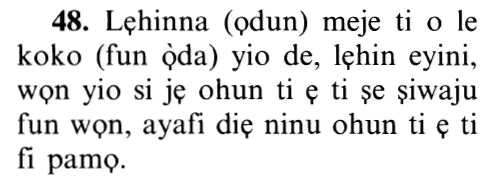12vs48
Select any filter and click on Go! to see results
ثُمَّ يَأْتِي مِن بَعْدِ ذَلِكَ سَبْعٌ شِدَادٌ يَأْكُلْنَ مَا قَدَّمْتُمْ لَهُنَّ إِلاَّ قَلِيلاً مِّمَّا تُحْصِنُونَ
Thumma yatee min baAAdi thalika sabAAun shidadun yakulna ma qaddamtum lahunna illa qaleelan mimma tuhsinoona
Index Terms
Click to play
Yoruba Translation

Hausa Translation
"Sa´an nan kuma waɗansu bakwai mãsu tsanani su zo daga bãyan wancan, su cinye abin da kuka gabãtar dõminsu, fãce kaɗan daga abin da kuke ãdanãwa."
Asbabu n-Nuzuul (Occasions of Revelation)
ثُمَّ يَأْتِي مِن بَعْدِ ذَلِكَ سَبْعٌ شِدَادٌ ...
and that (the harvest) which you reap you shall leave it in the ears, (all) except a little of it which you may eat. Then will come after that, seven hard (years),
He said, `Whatever you harvest during those seven fertile years, leave it in the ears so as to preserve it better. This will help the harvest stay healthy longer, except the amount that you need to eat, which should not be substantial. Stay away from extravagance, so that you use what remains of the harvest during the seven years of drought that will follow the seven fertile years.'
This was represented by the seven lean cows that eat the seven fat cows. During the seven years of drought, they will eat from the harvest they collected during the seven fertile years, as represented by the dry ears of corn in the dream. Yusuf told them that during these years, the remaining ears will not produce anything and whatever they try to plant, will not produce any harvest, so he said,
... يَأْكُلْنَ مَا قَدَّمْتُمْ لَهُنَّ إِلاَّ قَلِيلاً مِّمَّا تُحْصِنُونَ ﴿٤٨﴾
which will devour what you have laid by in advance for them, (all) except a little of that which you have guarded (stored).
ولهذا قال " يأكلن ما قدمتم لهن إلا قليلا مما تحصنون " ثم بشرهم بعد الجدب العام المتوالي بأنه يعقبهم بعد ذلك عام فيه يغاث الناس أي يأتيهم الغيث وهو المطر وتغل البلاد ويعصر الناس ما كانوا يعصرون على عادتهم من زيت ونحوه وسكر ونحوه حتى قال بعضهم : يدخل فيه حلب اللبن أيضا قال علي بن أبي طلحه عن ابن عباس " وفيه يعصرون " يحلبون .
"ثم يأتي من بعد ذلك" أي السبع المخصبات "سبع شداد" مجدبات صعاب وهي تأويل السبع العجاف "يأكلن ما قدمتم لهن" من الحب المزروع في السنين المخصبات أي تأكلونه فيهن "إلا قليلا مما تحصنون" تدخرون
" سبع شداد " يعني السنين المجدبات .
I'raab - grammatical analysis of the Qur'an
«ثُمَّ» عاطفة.
«يَأْتِي» مضارع مرفوع بالضمة المقدرة على الياء للثقل.
«مِنْ بَعْدِ» متعلقان بيأتي.
«ذلِكَ» اسم إشارة في محل جر بالإضافة واللام للبعد والكاف للخطاب.
«سَبْعٌ» فاعل.
«شِدادٌ» صفة.
«يَأْكُلْنَ» مضارع مبني على السكون لاتصاله بنون النسوة والنون فاعل والجملة صفة ثانية لسبع.
«ما» موصولية مفعول به.
«قَدَّمْتُمْ» فعل ماض وفاعله والجملة صلة لا محل لها.
«لَهُنَّ» متعلقان بقدمتم.
«إِلَّا» أداة استثناء.
«قَلِيلًا» مستثنى بإلا منصوب.
«مِمَّا» من حرف جر وما موصولية متعلقان بمحذوف صفة لقليلا.
«تُحْصِنُونَ» مضارع مرفوع بثبوت النون والواو فاعل والجملة صلة.
